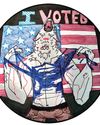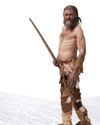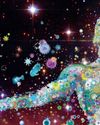It is an inarguable mathematical fact that every map is a lie.

Well, a map is not a lie in the sense of a statement intended to deceive someone. Maps do give us useful information about the world. But every map is a compromise. Statistician George Box famously said, “All models are wrong.” He was pointing out that no simplified mathematical formulation can perfectly capture the complicated reality of the world. He followed it up, though, with, “But some are useful.” Even models that are incomplete can help us understand the world, as long as we understand their strengths and limitations. The same is true of maps.
Mathematical Impossibility
In the 1820s, German mathematician Carl Friedrich Gauss proved the theorema egregium, which is Latin for “remarkable theorem.” (A theorem is a mathematical statement that can be proved using a chain of logical reasoning that starts with some basic assumptions.) One consequence of this theorem is the fact that there is no way to draw a flat map of the spherical Earth without some distortions. Of course, if you’ve ever peeled an orange or clementine and tried to press the peel completely flat, you might have figured that out already. It always tears somewhere.
Mathematical impossibility is no match for the convenience of a flat representation of the world, though. Geography textbooks and magazine pages just can’t accommodate tiny globes. So until virtual reality, holographic, or replication technology improves significantly and we can have accurate globes at our fingertips whenever we want, humans will keep drawing 2D maps despite Gauss’s theorem.
Compromise, Compromise, Compromise
Some maps distort area, some distort shapes, some distort directions and distances. Different situations call for maps with different strengths. For hundreds of years, cartographers have been creating maps that work the best for particular situations.
Diese Geschichte stammt aus der May - June 2019-Ausgabe von Muse Science Magazine for Kids.
Starten Sie Ihre 7-tägige kostenlose Testversion von Magzter GOLD, um auf Tausende kuratierte Premium-Storys sowie über 8.000 Zeitschriften und Zeitungen zuzugreifen.
Bereits Abonnent ? Anmelden
Diese Geschichte stammt aus der May - June 2019-Ausgabe von Muse Science Magazine for Kids.
Starten Sie Ihre 7-tägige kostenlose Testversion von Magzter GOLD, um auf Tausende kuratierte Premium-Storys sowie über 8.000 Zeitschriften und Zeitungen zuzugreifen.
Bereits Abonnent? Anmelden

A 12-Year-Old Girl's Election Sticker Is a Winner
VOTING IS A FUNDAMENTAL FREEDOM FOR AMERICANS, A MEANS OF DOING ONE'S CIVIC DUTY AND A WAY AN INDIVIDUAL CAN EXPRESS THEIR VOICE. In 1971, the United States lowered its voting age to 18. But that doesn't mean kids and teens under 18 can't participate in elections in various ways.

If everything the human brain does is basically sets of electrical impulses, how exactly does that translate into a state of mind?
You're not the only one asking this question. Every neuroscientist in the world is wondering the exact same thing, says Zach Mainen

EARTH'S TINIEST BUILDERS
THE HIDDEN WORLD OF MICROBES IN THE EARTH'S CRUST

MUMMIES SPEAK
ABOUT MICROBES, MIGRATION, AND MORE

GOING WITH YOUR GUT
HOW DO MICROBES AFFECT OUR HEALTH? LET'S COUNT THE WAYS...

BUG Detective
A burglar sneaks into a house on a quiet street in New York City. He walks through the house, touching countertops and door handles. Finally, he steals a single card from a full deck. Then he leaves.

Little Creatures Among Us THE MANY MICROBES IN OUR DAILY LIVES
When you think you're alone, you're actually not. In the ground, the air, your room, and even your body are Strillions and trillions of creatures so tiny you can't see them.

A Mars Rock Found With Leopard Spots Could Be a Sign of Ancient Life
IN JULY, NASA'S PERSEVERANCE ROVER CAME ACROSS A SPOTTED ROCK IN WHAT WAS ONCE A RIVERBED IN THE JEZERO CRATER ON MARS.

Para Athlete Uses Exoskeleton Suit to Carry the Olympic Torch
In July, a 36-year-old French tennis para athlete, Kevin Piette, got a chance to participate in this summer’s Olympic torch relay without using a wheelchair.

Ancient Egyptians May Have Used a Water System to Lift Stones to Build Pyramid
HOW ANCIENT EGYPTIANS BUILT THE MASSIVE PYRAMIDS IN EGYPT MORE THAN 4,000 YEARS AGO HAS LONG BEEN A TOPIC OF WONDER AND DEBATE.